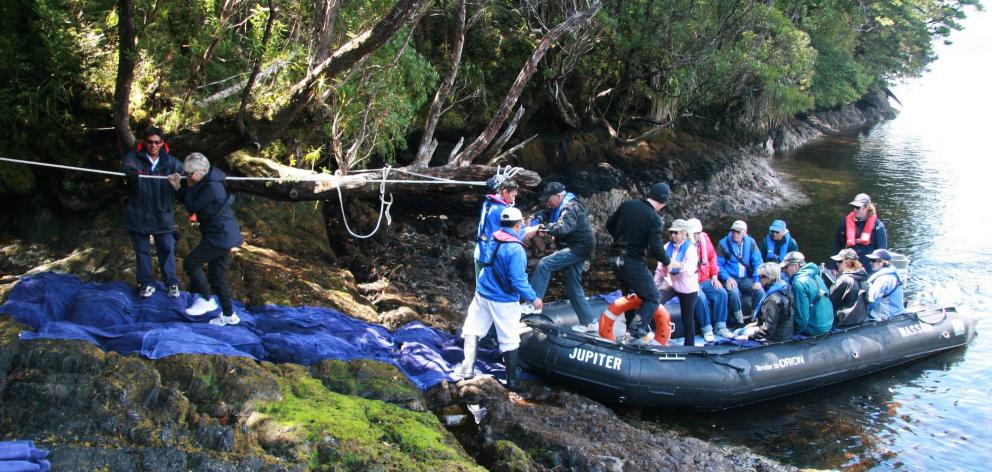
Like a certain virus, 9/11 was tipped to cripple airlines around the world. Who’d ever fly again? But the pundits had it wrong about the consequences of the horrific Twin Towers terrorist attack in New York on September 11, 2001.
Air travel soon soared into life after governments, airports and airlines bolstered security. More services, larger planes. Tourism resumed on a mass-market scale.
I’d begun part-time work in the travel business myself then, as a guest speaker and guide aboard small expedition cruise ships voyaging around mainland New Zealand and to the New Zealand subantarctic islands over summer.
These cruises, involving about 100 passengers at a time, aren’t cheap. American charterers call them "study tours". They attract people who want to spend a couple of weeks exploring a country’s less accessible places through shore excursions and zodiac inshore cruising, and who typically extend their stay on land before or after the voyage.
Will we see the likes again? I hope so. It’s tourism at a value-added scale. It’s how we should pitch travel here.
I remember when Tourism New Zealand was trumpeting the dubious "100% Pure" slogan, its annual target being two million overseas visitors. It seemed pie in the sky at the time. Well, we ended up with double that, just on four million — and an industry scrambling to build and sustain infrastructure to handle such numbers and source well-trained staff.
New Zealand tourism needs to become a niche market where visitors stay longer, spend more and don’t overload utilities and the transport sector in places like Queenstown.
International tourism has taken an almighty hit. It’s hard to imagine a return to the old normal in the industry. To do so would risk spoiling New Zealand’s allure.
In short, we need a whole new deal. Growth, yes up to a point, but at a respectful pace.
Before the pandemic, the tourism industry seemed intent on relentless growth.
Air New Zealand appeared to be oblivious to the concept of limits to growth. It expanded its fleet and services, and rushed to put bums on seats way ahead of what the likes of Queenstown, Milford Sound and Rotorua — and their wider environments — could reasonably cope with. In tourist centres, queues, crowded footpaths and packed visitor attractions were some of the outcomes, along with community pressures in burgeoning residential areas, including infrastructure stress and soaring rents.
The idea of limiting growth is nothing new. In the early 1970s, an international think-tank called the Club of Rome and a United Nations conference at Stockholm reminded the world of Earth’s finite resources and the need for an economy that sustains natural capital. The term "sustainable development" was coined — and it made sense until, in some quarters, it was sullied by association with sustaining incomes, jobs and GDP.
In the 1980s and subsequently, neoliberal and capitalist greed politics rode roughshod over the idea of nurturing the natural environment to support economic outcomes. In the midst of a highly-disruptive and ongoing pandemic, some political voices continue to clamour for the old order to be restored and business as usual to resume. For the sake of planetary health and socio-economic resilience, it ought not to happen.
The Covid pandemic is a prolonged wake-up call for humanity to find a new direction. There’s no better time to roll out the big ideas and opportunities than in a global crisis.
A decade ago the "limits of growth" concept was pitched by Western-world futurists as the "economics of enough" and the "madness of more". So here we are, 20% of the way through the 21st century, contemplating a critical turning point for humanity.
To help ease wealth inequality, radical reforms should include a Universal Basic Income scheme or something similar, which would go a long way towards overcoming an escalating problem with poverty. The trickle-down theory of spreading wealth has failed, glaringly, in a country that prides itself on equity and a fair go.
With unemployment rates rising and a recession looming, the notion of work itself will need redefining. Is a 40-hour working week viable? Job sharing is an option. Technology and automation will determine novel work patterns. During lockdown, thousands of people found they could work from home, thereby saving on transport costs and reducing greenhouse gas emissions.
Besides the immense threat of Covid-19 and the huge responses required to live with the virus maybe for years to come, two other crises triggered by human behaviour — climate disorder and biodiversity loss of mass-extinction proportions — are also confronting us.
On the question of countering biodiversity loss in New Zealand, the previous government proposed a target date of 2050 to be predator-free — a worthy ambition but lacking commensurate funding and tools. We need substantial examplar projects. As a model for eradicating predators on the two main islands, a model first step could be to eliminate feral cats, rats and possums from Stewart Island-Rakiura, our third-largest island, which has a head start by being free of stoats, ferrets and weasels.
But by far the toughest challenge will come from climate change, better described as global heating.
For decades, climatologists have been warning that global heating is warming our oceans. It’s a trend — a double whammy of sea-level rise and increased storminess — that will continue until next century even if we get to net-zero carbon emissions. Low-lying coastal areas vulnerable to flooding and erosion are the front line of global heating, and the next government will need to urgently address the two horns of the climate dilemma — adaptation to climate impacts and mitigation of greenhouse gas emissions.
We’ve been slow to react and Covid-19 has diverted political attention away from longer-term issues.
No longer fit for purpose, the Resource Management Act, 30 years old next year, has failed to anticipate the reality of climate disorder. The Act urgently requires overhaul, as does our thinking around sustainability and resilience.
Will people still travel? Yes, but they will probably think twice about long-haul flights and distant-seas cruising. In the medium term, New Zealand tourism, outbound, might largely focus on Australia and the South Pacific, while our largest inbound market for international visitors, the Aussies, should be keen to come back big-time, although not for a while yet. As New Zealanders learn to appreciate attractions in their homeland they’ve ignored for years, domestic tourism is bound to expand from a lockdown base. Boomer-age folks should lead the way.
The isolation of Aotearoa New Zealand, which James Cook surmised was "as far as man may go", has its advantages in a global pandemic. Well connected in a digital sense, we can become much more self-sufficient in a low-carbon future — quite capable, so to speak, of cutting our own lunch.
But it will take a whole new deal and gutsy political leadership once the Covid-19 pandemic is under control to ready us for the really big challenges of the 21st century.
Responses that might seem radical today could be regarded as commonplace in the future.
■ Dunedin writer Neville Peat is a former city and regional councillor and the author of The Invading Sea: Coastal hazards and climate change in Aotearoa New Zealand.
Comments
I think this article epitomizes everything wrong in focusing on tourism as a primary driver of the NZ economy. Sure, let's just stick our heads in the sand and wait for international tourism to resume. In the interim we will focus on the Australian market and South Pacific. Rubbish! How about a paradigm shift! Tourism may never return as the source of income it once was. How about focusing on the production of goods that we need here in NZ? How about the production of food reducing our reliance on imports? How about the production of medicines and medical devices for domestic use and export? How about an investment in infastructure to attract foreign investment in manufacturing? Tourism should be a fraction of the economy and we need to change our attitude and reliance on it. If tourists want to come here...great! But we need to move away from relying on them to put food on our tables! People like this keep trying to take us back to a place we've already been. We need to move on because reliance on tourist dollars is killing this country! COVID just proved that point.
I agree we do need a radical change, the more we try save our current way of life the more it will cost us in the future. Travel, energy, consumption, food, work, waste management, conservation and maybe even the way we are governed all need to change. It will be a mistake just to go back to the way it was, we need to go forward.
In 2017 scientists warned humans are causing the sixth mass extinction in the Earth’s history. Now the UN has just reported that the world has failed to meet a single target agreed a decade ago to stem the destruction of wildlife and life-sustaining ecosystems.












